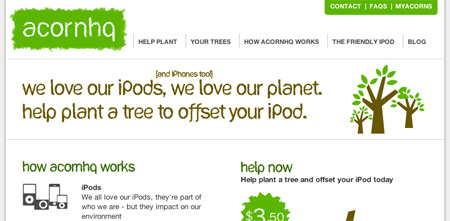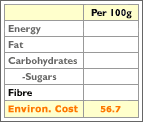A couple of months ago I left my position at Ponoko, handing over to the highly capable Josh (aka Mr Judkins). It was quite emotional leaving Ponoko, *sniff*. We were in Argentina at the time and Sarah suggested it would be a good idea to take a couple of months off once we got to London.
“And do what exactly?” I said.
“Whatever you want!” came the rather apt reply…
I got to chew on that chestnut while we continued traveling around Argie. The two big reaffirmations for were: 1) I love the web, still… and 2) I love to create. Then I had an idea I knew I wanted to work on followed by another and another.
So here’s the first, AcornHq:
AcornHq is, in a sentence, a carbon offset site for iPod and iPhone users.
At the very core the idea was to promote more environmentally responsible gadget ownership. To start with this means we provide an easy way for people to offset the carbon associated with their iPod or iPhone.
We all love our iPods and iPhones but they do have a very real cost to the environment. Carbon is emitted when your iPod is manufactured, when your iPod is transported from the factory to you, and when you use power to recharge your iPod. How that power is generated to recharge your iPod also has a huge impact. Think hydro vs. coal…
So you come to AcornHq and join a tree by purchasing a leaf, for US$3.50. Once all the leaves on that tree have been taken, we plant a tree in the South Island to offset those iPods. Trees being most excellent at extracting and absorbing atmospheric carbon dioxide.
You can then place your tree on your website and watch it fill up with leaves as more people join it. Also, when the trees we plant reach the end of their life, the plan is for any timber produced by the trees to go into community housing projects.
This is just the start and I’m quite excited about everything else to follow but do have a look and let me know what you think!
–
A big public thank you to my lovely wifey for helping me wrap my brain around this idea and asking the hard but essential questions. Thanks to Olmec Sinclair too for his hard work which has ultimately allowed me to realise this idea.
This is the first of (what I hope will be) three or four wee projects you’ll see from me in the next couple of months.
P.S. Argentina has to be one of the most insanely great countries in the world, you really should go visit. It’s a total Lovemark for me – hope to go back to live one day.

 If we had, as consumers, a way of quickly making a comparison and decision based off a number figure or index we’d be a lot closer to becoming more responsible consumers. How it would exactly work is another seperate problem and as always any system is able to be abused and misused. But would it be insane to imagine it working something like this?
If we had, as consumers, a way of quickly making a comparison and decision based off a number figure or index we’d be a lot closer to becoming more responsible consumers. How it would exactly work is another seperate problem and as always any system is able to be abused and misused. But would it be insane to imagine it working something like this?